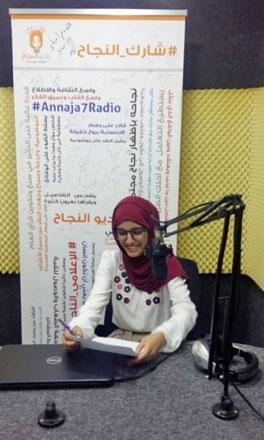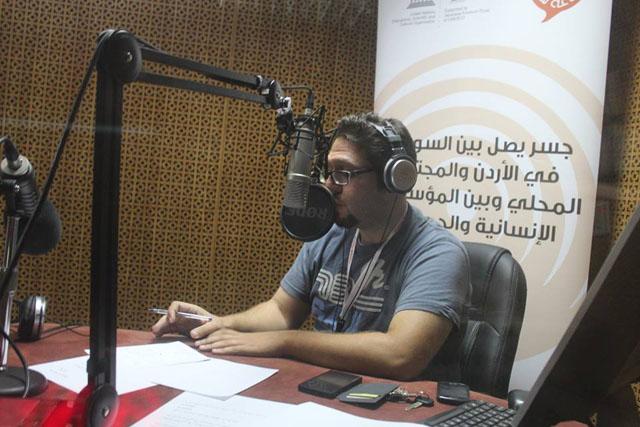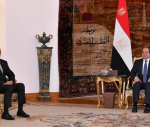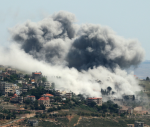You are here
UNESCO workshop encourages Jordanian journalist to tackle tough issues
By Elizabeth Turnbull - Jul 30,2019 - Last updated at Jul 30,2019

In this undated photo, Sara Momani broadcasts live from Radio Annaja7 (Photo courtesy of UNESCO)
AMMAN — Many individuals shy away from discussing sensitive issues, but Sara Momani, 25, is not one of these people.
Not only is she unafraid to bring up issues such as online harassment and human rights violations, but she does so over the radio on "Pulse" — an investigative journalism radio series she created.
“I seek to make people aware of social concerns and then explore what their rights are on air," Momani was quoted as saying in a report sent to The Jordan Times.
"Within the Jordanian context, this is important, as people are often unaware of their rights, especially in complex social cases. Our rights are sometimes deliberately disregarded, especially women’s,” she said.
After participating in a workshop series offered by the UNESCO Amman office and Journalists for Human Rights that focused on professional reporting, Momani went from being a volunteer at Radio Annaja7, to being radio staff, to ultimately airing her own 12 episode series.
The training, a key component of the ongoing joint UNESCO- United Nations Office of Counter-Terrorism (UNOCT) “Youth Peace building” project co-funded by Canada, was extended to staff and volunteers from Radio Annaja7 and highlighted best practices for responsible journalism.
As a strong advocate for gender equality, Sara was drawn to the training and was curious about how women fit into the human rights agenda, she said.
“The trainers really reinforced to participants that women and men need to be treated equally and fairly, both in media and everyday life, and how we can ensure this,” she said.
Ultimately, Momani has been encouraged by positive reactions to her coverage of various issues.
“When I was covering survivors of human rights violations, people were thrilled that I had brought this to light and that these topics were being discussed in public," she was quoted as saying in the statement. "Seasoned journalists have provided feedback saying that this was innovative broadcasting.”
In order to ensure the free flow of ideas, optimise progress and build knowledgeable societies, UNESCO believes that free, independent and pluralistic media in print, broadcast and online is needed, read the report.
Momani's next venture, which begins in a few weeks, reflects this idea, as she will seek to tell the stories of people who have been detained as a result of restrictions to their freedom of expression.
In addition to support from UNESCO and Annaja7, Momani’s family has played an important role in helping and supporting her on this journey.
“I am the second youngest of seven children," Momani said. "At first, my mom was worried about me because I travel far from my home town of Ajloun to do my work. My dad convinced her to let me try and after they saw my talent, they started to feel proud of me”.
Related Articles
AMMAN — Some 100 youth and partners on Sunday gathered at the King Hussein Club, to share their personal experiences in the field of media a
AMMAN — The efforts of local community radio station Farah Al Nas in tackling political, social and developmental issues related to youth an
A radio show initially conceived to benefit Syrian refugees living among host communities has also become a tool enabling Jordanians to know more about Syrians’ plight and interact with them.

















